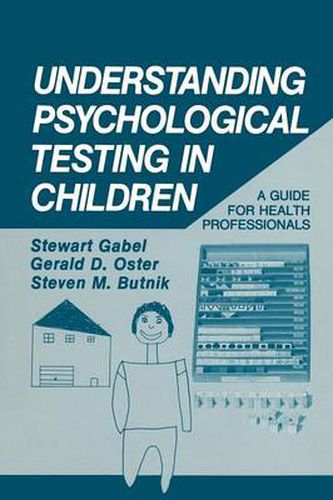Readings Newsletter
Become a Readings Member to make your shopping experience even easier.
Sign in or sign up for free!
You’re not far away from qualifying for FREE standard shipping within Australia
You’ve qualified for FREE standard shipping within Australia
The cart is loading…






This title is printed to order. This book may have been self-published. If so, we cannot guarantee the quality of the content. In the main most books will have gone through the editing process however some may not. We therefore suggest that you be aware of this before ordering this book. If in doubt check either the author or publisher’s details as we are unable to accept any returns unless they are faulty. Please contact us if you have any questions.
There is a considerable amount of interest within pediatrics and pri mary health care that is currently being directed toward the behavioral and emotional problems of childhood. Traditionally, these areas have been emphasized by child psychiatrists, child psychologists, and psy chiatric social workers. Now, however, the detection and, in some cases, the assessment and treatment of children with these types of disturb ances fall within the province of primary child health care profession als. Even when the child psychiatrist or child psychologist provides the primary mental health treatment for the child, specialists such as pediatricians, family physicians, pediatric nurses, pediatric nurse prac titioners, and speech therapists remain instrumental in support of the ongoing psychotherapeutic process as providers of some other aspect of total health care to the child and family. For these pediatricians, family physicians, and other nonpsychol ogist primary health care providers, it is essential to acquire an under standing and effective working knowledge of important psychological information and concepts to utilize within their own framework and professional responsibilities. In order that this may be accomplished, these professionals with limited backgrounds in psychology must better understand how psychologists themselves assess children and how they derive the conclusions reflected in the statements and reports that are shared with members of their own and other disciplines. In short, nonpsychologists must become substantially more familiar with psy chological assessment, particularly with psychological testing and the subsequent reporting of results.
$9.00 standard shipping within Australia
FREE standard shipping within Australia for orders over $100.00
Express & International shipping calculated at checkout
This title is printed to order. This book may have been self-published. If so, we cannot guarantee the quality of the content. In the main most books will have gone through the editing process however some may not. We therefore suggest that you be aware of this before ordering this book. If in doubt check either the author or publisher’s details as we are unable to accept any returns unless they are faulty. Please contact us if you have any questions.
There is a considerable amount of interest within pediatrics and pri mary health care that is currently being directed toward the behavioral and emotional problems of childhood. Traditionally, these areas have been emphasized by child psychiatrists, child psychologists, and psy chiatric social workers. Now, however, the detection and, in some cases, the assessment and treatment of children with these types of disturb ances fall within the province of primary child health care profession als. Even when the child psychiatrist or child psychologist provides the primary mental health treatment for the child, specialists such as pediatricians, family physicians, pediatric nurses, pediatric nurse prac titioners, and speech therapists remain instrumental in support of the ongoing psychotherapeutic process as providers of some other aspect of total health care to the child and family. For these pediatricians, family physicians, and other nonpsychol ogist primary health care providers, it is essential to acquire an under standing and effective working knowledge of important psychological information and concepts to utilize within their own framework and professional responsibilities. In order that this may be accomplished, these professionals with limited backgrounds in psychology must better understand how psychologists themselves assess children and how they derive the conclusions reflected in the statements and reports that are shared with members of their own and other disciplines. In short, nonpsychologists must become substantially more familiar with psy chological assessment, particularly with psychological testing and the subsequent reporting of results.